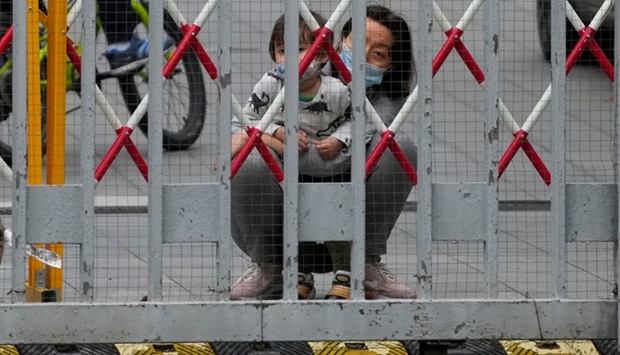Shanghai on Tuesday declared it had achieved "zero-Covid" across all its districts, sparking derision on social media as millions in China's biggest city remained under lockdown.
Confronted with its worst outbreak since the beginning of the pandemic, China -- the last major economy still closed off to the world -- put the city of 25 million under heavy restrictions in early April.
The government's insistence on squashing the Omicron-variant-driven outbreak prompted rare protests and angry scuffles with authorities as Shanghai residents reject the prolonged confinement and food shortages.
"All 16 districts of Shanghai have already achieved zero-Covid at the community level," Shanghai health commission official Zhao Dandan told reporters on Tuesday.
That means none of the over 1,000 new infections recorded on Tuesday was detected outside of quarantined areas, city authorities said.
China's strategy to achieve zero Covid cases includes strict border closures, lengthy quarantines, mass testing and rapid, targeted lockdowns.
Vice mayor Chen Tong said on Sunday that the city would gradually reopen businesses starting this week, without giving specifics.
But millions in Shanghai were still unable to leave their residential compounds on Tuesday.
More than 3.8 million people were officially still under the strictest forms of lockdown in the city, according to official figures.
Social media erupted in disbelief at the gap between official statements and the reality of life under an enduring lockdown.
"Since society has reached Covid-zero, why are people in Songjiang district still only allowed to go out once every two days?" a blogger on the Twitter-like Weibo asked.
"Is this a parallel universe Shanghai?" asked another.
In some areas of the city, restrictions have even been quietly tightened in recent days.
Live video broadcast Tuesday by Chinese media showed crowds gathering at Shanghai's Hongqiao Railway Station as train services leaving the city resumed.
Meanwhile, multiple airlines resumed domestic flights out of Shanghai this week after nearly all routes out of the city were suspended during the outbreak.
People are only allowed to leave Shanghai after receiving permission and taking multiple Covid tests.
- Economic slowdown -
China has shown no sign of giving up its protracted struggle to maintain zero Covid cases, despite the mounting economic costs of miserable retail, house and car sales and climbing unemployment.
The country kept cases low for much of the pandemic through its strict strategy, but the surge in Omicron cases in recent months has raised questions about zero-Covid's sustainability.
Chinese health officials on Monday said they had detected the country's first case of the highly transmissible Omicron subvariant BA.2.12.1 -- already widespread in countries including the US -- in a traveller arriving from Kenya.
Beijing is mass testing residents almost every day after a surge in cases -- counted in the dozens each day but still enough to prompt tight restrictions on movement and association.
Millions of people in the capital have been ordered to work from home and transport services have been suspended with people fearing a repeat of Shanghai's lockdown chaos.
Tightened Covid rules on Beijing's university campuses also provoked a rare show of defiance from angry students over the weekend, with hundreds gathering outside one Peking University dormitory to protest new movement restrictions.
The recent lockdowns dragged retail sales and factory output in the country down in April to their lowest level since March 2020, with analysts warning that disruptions could extend into the summer.

